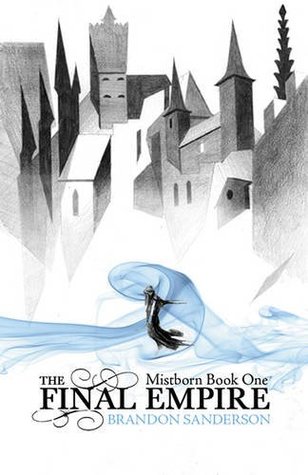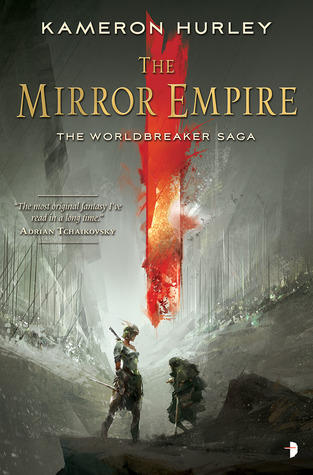Description from Goodreads
In a world where ash falls from the sky, and mist dominates the night, an evil cloaks the land and stifles all life. The future of the empire rests on the shoulders of a troublemaker and his young apprentice. Together, can they fill the world with colour once more?
In Brandon Sanderson's intriguing tale of love, loss, despair and hope, a new kind of magic enters the stage - Allomancy, a magic of the metals.
❄❄❄
Why on Earth did it took me so long to read Mistborn: the Final Empire? What's wrong with me?? Despite all the great reviews, the amazing blurb, the constant hype around Sanderson's books, what do I do? I WAIT. I really should have more trust on humanity when it recommends a book that has a rating of 4.40 on Goodreads. Because. Mistborn: The Final Empire was beautiful. I should probably warn you right now that there will be lots of rambling (probably incoherent), praise, and maybe even a couple of salty virtual tears on the screen.
I don't think there was even one character who I didn't like. All of them were so well-written: they had distinct personalities, strengths and weaknesses, and they felt multidimensional. Vin, the main character found from the alleys of Luthadel, and Kelsier, incredibly talented Allomancer, were my favourite characters by far. Vin who is about sixteen-years old and Kelsier who is over thiry, were interestingly but probably not coincidentally, similar to each other, not only in terms of personality, but how they had experienced a very harsh lives. I'm not going to go in detail about that as it is part of the 'fun' to learn about these character's histories and what sort of tragedies they have gone through. In addition, Elend, a young nobleman from the House of Venture, and Sazed, a Terrisman, were really interesting characters and I'm very intrigued how they will be included in the future novels.
Sanderson is the king of world building: he has the most amazing imagination and he isn't afraid to play around with all the crazy ideas he has. First of all, even though Allomancy (or using the metals to give you magical powers) may not sound the most intriguing concept, Sanderson is able to make it absolutely fascinating by writing about it in so much detail and consideration that Allomancy comes alive on the pages and in readers' minds. Each specific metal gives you a specific ability and by using different metals you can have various different heightened senses or capabilities. Even though all the information was first a bit much to take in, the readers quickly learn what each metal does and what are its limits. The idea how the main character Vin, who is taken in by a rebel criminal group, (and other Allomancers too), is taught how to use the metals by Kelsier (the leader of the group) and how she learns to use them so beautifully, is really entertaining to read about.
The funny thing is that I was expecting Mistborn: the Final Empire to be somewhat, well, more masculine in the traditional sense, for lack of a better word. The novel did have its gruesome scenes and very epic battle scenes, but there was surprisingly lot about dancing balls and etiquettes, dresses, and crushes. These a bit more lighter scenes were very welcome as they made the novel diverse in the sense that it didn't simply focus on Allomancy, but also explored the society of Luthadel and themes of love and friendship. There was a slight romance aspect to the book too, but the novel was never only about this romance. I really enjoyed this choice by Sanderson as otherwise the horrors caused by the Lord Ruler, the horrifying dictator, would have gotten less attention and so less emphasis and impact.
But I have to make a confession. As I liked Mistborn: the Final Empire so much, I'm hesitant to start reading the second book of the series, The Well of Ascension, because I'm afraid it won't be able to live up to the first book. I know, it's silly, but what if the second book isn't as good and that kind of eats away my love for the series? But, fear not, I'm going to read the next book for sure, but I'm just going to need my time to muster all the courage and plunge into the world of Allomancy again. Most likely, I'll feel exactly the same after reading the second book as I after finishing reading Mistborn: the Final Empire: "What's wrong with me?? Despite all the great reviews, the amazing blurb, the constant hype around Sanderson's books, what do I do? I WAIT."
☆☆☆☆☆


